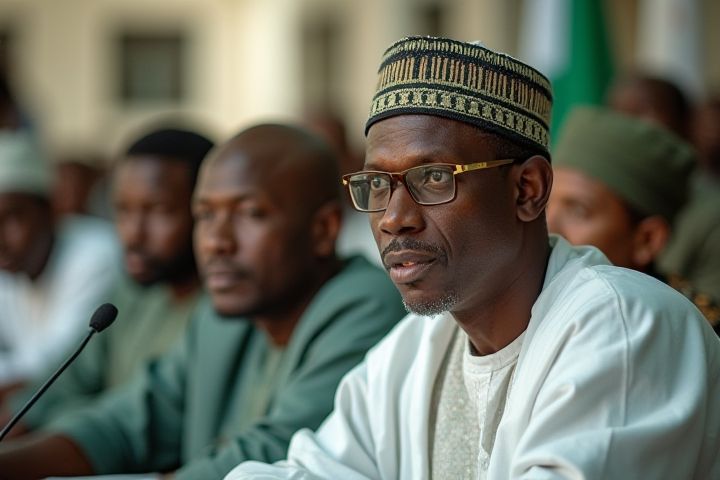
The political climate in Nigeria is characterized by a complex interplay of democratic governance, ethnic diversity, and socio-economic challenges. Major political parties, including the All Progressives Congress (APC) and the People's Democratic Party (PDP), dominate the electoral landscape, often leading to intense rivalry. Corruption and governance issues significantly impact public trust, influencing voter participation and civic engagement. With upcoming elections, issues such as insecurity, economic instability, and infrastructure deficits are at the forefront of political discourse, shaping policies. You may find that grassroots movements and youth activism are increasingly vital in advocating for change and accountability in the Nigerian political system.
Multiparty democracy
Nigeria's political climate is characterized by a multiparty democracy, fostering a diversity of political voices and representation. This dynamic system enables various parties to contest elections at federal, state, and local levels, reflecting the country's rich ethnic and regional diversity. Key political parties include the All Progressives Congress (APC) and the People's Democratic Party (PDP), each promoting distinct ideologies and policies. Voter participation and engagement are vital components of this democracy, empowering citizens to influence governance through their electoral choices.
Ethnic diversity
Nigeria's political climate is significantly shaped by its ethnic diversity, comprising over 250 distinct ethnic groups, with the Hausa, Yoruba, and Igbo being the most prominent. This rich tapestry influences governance, resource allocation, and party dynamics, often leading to tensions and alliances that can shift rapidly. Ethnic identities play a crucial role in electoral politics, as political parties frequently align along ethnic lines to garner support from specific groups. Understanding these dynamics is essential for analyzing Nigeria's political strategies and ensuring inclusive governance that respects the diverse interests of its populace.
Economic challenges
Nigeria's political climate is heavily influenced by its ongoing economic challenges, characterized by high inflation rates and a struggling currency. The nation grapples with unemployment levels that exceed national averages, impacting millions of citizens and fueling social unrest. Efforts to diversify the economy are critical, with a focus on sectors like agriculture and technology to reduce dependence on oil revenues. You may follow policy developments and electoral reforms that aim to address these economic issues and improve the overall quality of life for Nigerians.
Security concerns
Nigeria's political climate is heavily influenced by pressing security concerns, particularly from insurgent groups like Boko Haram and ongoing conflicts among ethnic factions. The instability has led to increased military presence and governmental initiatives aimed at restoring order and protecting citizens. Lynching, kidnapping for ransom, and resource-based violence exacerbate these issues, challenging the effectiveness of local law enforcement. You may find that community engagement and international cooperation are essential in fostering a more secure and stable Nigeria.
Youth population
Nigeria's political climate is increasingly influenced by its vibrant youth population, which constitutes over 60% of the nation's demographics. This young electorate has become a pivotal force in advocating for reform, driving discussions on pressing issues such as education, employment, and governance. Social media platforms serve as critical tools for mobilization, enabling youth to voice their concerns and demand accountability from leaders. By harnessing their collective power, Nigeria's youth are reshaping the political landscape, positioning themselves as catalysts for change in the quest for a more equitable society.
Oil dependency
Nigeria's political climate heavily revolves around its oil dependency, with the petroleum sector accounting for a significant portion of the nation's GDP and export revenue. This reliance creates vulnerabilities, as fluctuations in global oil prices can lead to economic instability and fiscal challenges for the government. The country grapples with issues such as corruption, mismanagement, and environmental degradation caused by oil extraction, which often exacerbate social unrest. You may find that ongoing discussions about diversifying the economy and investing in renewable energy are gaining traction as potential solutions for a more sustainable future.
Corruption issues
Nigeria's political climate is heavily influenced by persistent corruption issues, significantly undermining governance and public trust. Authorities frequently face allegations of embezzlement, bribery, and misappropriation of funds, which stifles economic growth and exacerbates poverty. The recent efforts by the Nigerian government to improve transparency through various anti-corruption initiatives have met with mixed results, often hindered by deep-rooted systemic corruption. As a citizen, your engagement in civic activities and support for accountability measures can contribute to fostering a more transparent political environment.
Electoral processes
Nigeria's political climate is heavily influenced by its electoral processes, which are critical to the nation's democracy. The Independent National Electoral Commission (INEC) oversees elections, ensuring compliance with regulations and transparency in the voting system. Challenges such as electoral fraud, violence, and voter apathy hinder participation and undermine the legitimacy of elections. As a citizen, your engagement in the electoral process can foster accountability and strengthen democratic governance in Nigeria.
Regional tensions
The political climate in Nigeria is characterized by regional tensions, particularly between the diverse ethnic groups and geopolitical zones. Northern Nigeria grapples with the challenges posed by insurgency and the socio-economic impact of resource distribution, while the southern regions frequently contest issues surrounding oil wealth and governance. The struggle for power often exacerbates grievances, leading to inter-communal conflicts that threaten national cohesion. Understanding these regional dynamics is crucial for anyone looking to engage with Nigeria's complex socio-political landscape.
Social media influence
The political climate in Nigeria has been significantly shaped by the rise of social media, which serves as a powerful platform for political discourse and activism. Key figures, including politicians and influencers, leverage social media channels like Twitter and Instagram to communicate directly with the electorate, bypassing traditional media constraints. This digital landscape has enabled grassroots movements, such as the #EndSARS protests, to gain momentum, spotlighting critical social issues and galvanizing youth participation. Understanding the dynamics of this influence can enhance your awareness of the evolving nature of Nigerian politics and public engagement.
